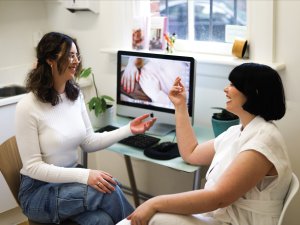Respiratory physician Lutz Beckert considers chronic obstructive pulmonary disease management, including the prevention of COPD, the importance of smoking cessation and pulmonary rehabilitation, and the lifesaving potential of addressing treatable traits. He also discusses the logic of inhaler therapy, moving from single therapy to dual and triple therapy when indicated, as well as other aspects of management
Menstrual tracking apps may strengthen patient relationship with GP
Menstrual tracking apps may strengthen patient relationship with GP
![Bryndl Hohmann-Marriott [Image: Louise Pearman-Beres]](/sites/default/files/styles/cropped_image_16_7_/public/2023-02/Bryndl%20Hohmann-Marriott%20CR%20Louise%20Pearman-Beres.jpg?itok=xUWJxbIZ)
“People feel more believed when they hold this ‘data’ from their app”
The most common menstruation-tracking apps lack medical accuracy and they’re often not suitable for people with menstrual disorders, New Zealand researchers report.
But the apps can be a useful tool to strengthen the relationship between patients and their GP, say researchers led by associate professor of sociology Bryndl Hohmann-Marriott, of the University of Otago.
Dr Hohmann-Marriott’s team investigated the role period-tracking apps could play in primary care. The findings appear online in the New Zealand Medical Journal today.
Smartphone applications to record users’ menstrual cycle are very commonly used, but Dr Hohmann-Marriott says most are not designed for healthcare.
The researchers’ survey received 144 survey responses; 44 per cent of respondents were using a menstrual app, and 26 per cent were healthcare providers. Focus groups were then held and included people of a range of ethnicities and genders.
Dr Hohmann-Marriott says the study wasn’t large enough to identify any real evidence about the appropriateness of apps according to ethnicity or gender.
The most common two apps on the market are Flo and Clue – both designed in Europe and most common in the US. Most apps discussed in the study are not particularly suited for the Aotearoa context, say the researchers.
Most period-tracking apps work off a calendar model, Dr Hohmann-Marriott says. Their main function is to help the user record different stages of their menstrual cycle to identify patterns, and provide ovulation and fertility estimates.
This can be a valuable tool to identify potential menstrual disorders and provide the patient with a source of “evidence” to present to their healthcare provider.
One respondent says: “[As] a practitioner myself, I find it super helpful to look through the history of the app if a woman presents with inconsistent periods, infertility or even pregnancy that needs to be dated.”
Dr Hohmann-Marriott says this record-keeping is not restricted to smartphone apps and can be done just as accurately by recording menstrual patterns on a paper calendar; but patients often find the app useful and convenient.
The “digital healthcare” persona of a menstrual app may also positively contribute to the patient–provider relationship, Dr Hohmann-Marriott suggests.
“People feel more believed when they hold this ‘data’ from their app.”
Another practitioner who took part in the study says: “As a doctor, it gives me an objective record of a patient’s cycles, rather than relying on them to remember…”
Dr Hohmann-Marriott says the apps may not be suitable for managing conditions such as endometriosis or polycystic ovary syndrome (PCOS), as they don’t take these into consideration when calculating estimates.
Endometriosis affects approximately 11 per cent of reproductive-age women and can cause severe and chronic pain, organ damage and infertility, the article points out.
Aotearoa also has a significant average diagnosis delay of 8.7 years for endometriosis, the researchers say.
Dr Hohmann-Marriott says the process of diagnosis for menstrual disorders such as endometriosis and PCOS is something primary care needs to work on – “whether it’s with an app or not”.
As with any app or digital service that collects data, many people are cautious about losing data sovereignty, as when their information is sold to marketers.
Another downfall of menstrual apps is they record specific information only. While they provide estimates for ovulation, and next period dates, these make assumptions about the user that are not always correct, Dr Hohmann-Marriott says.
For example, there is no way to accurately measure someone’s time of ovulation using an app, but its estimates may appear trustworthy, she says.
Elizabeth Bromley, founder of Dunedin-based period clinic Hekate, says users may believe they can use their app as a form of birth control, which is reaching far beyond the capability of the technology.
Menstrual education and more investment in research and resources is the way to equip both patients and providers with the best tools, Ms Bromley says.
She says it’s great that many apps can be used to improve self-awareness around menstruation, but users must know the benefits and limitations.
Ms Bromley suggests menstrual health checks be a routine part of a wellness check.
We're publishing this article as a FREE READ so it is FREE to read and EASY to share more widely. Please support us and the hard work of our journalists by clicking here and subscribing to our publication and website








![Barbara Fountain, editor of New Zealand Doctor Rata Aotearoa, and Paul Hutchison, GP and senior medical clinician at Tāmaki Health [Image: Simon Maude]](/sites/default/files/styles/thumbnail_cropped_100/public/2025-03/Barbara%20Fountain%2C%20editor%20of%20New%20Zealand%20Doctor%20Rata%20Aotearoa%2C%20and%20Paul%20Hutchison%2C%20GP%20and%20senior%20medical%20clinician%20at%20T%C4%81maki%20Health%20CR%20Simon%20Maude.jpg?itok=-HbQ1EYA)
![Lori Peters, NP and advanced health improvement practitioner at Mahitahi Hauora, and Jasper Nacilla, NP at The Terrace Medical Centre in Wellington [Image: Simon Maude]](/sites/default/files/styles/thumbnail_cropped_100/public/2025-03/2.%20Lori%20Peters%2C%20NP%20and%20advanced%20HIP%20at%20Mahitahi%20Hauora%2C%20and%20Jasper%20Nacilla%2C%20NP%20at%20The%20Terrace%20Medical%20Centre%20in%20Wellington%20CR%20Simon%20Maude.jpg?itok=sUfbsSF1)
![Ministry of Social Development health and disability coordinator Liz Williams, regional health advisors Mary Mojel and Larah Takarangi, and health and disability coordinators Rebecca Staunton and Myint Than Htut [Image: Simon Maude]](/sites/default/files/styles/thumbnail_cropped_100/public/2025-03/3.%20Ministry%20of%20Social%20Development%27s%20Liz%20Williams%2C%20Mary%20Mojel%2C%20Larah%20Takarangi%2C%20Rebecca%20Staunton%20and%20Myint%20Than%20Htut%20CR%20Simon%20Maude.jpg?itok=9ceOujzC)
![Locum GP Helen Fisher, with Te Kuiti Medical Centre NP Bridget Woodney [Image: Simon Maude]](/sites/default/files/styles/thumbnail_cropped_100/public/2025-03/4.%20Locum%20GP%20Helen%20Fisher%2C%20with%20Te%20Kuiti%20Medical%20Centre%20NP%20Bridget%20Woodney%20CR%20Simon%20Maude.jpg?itok=TJeODetm)
![Ruby Faulkner, GPEP2, with David Small, GPEP3 from The Doctors Greenmeadows in Napier [Image: Simon Maude]](/sites/default/files/styles/thumbnail_cropped_100/public/2025-03/5.%20Ruby%20Faulkner%2C%20GPEP2%2C%20with%20David%20Small%2C%20GPEP3%20from%20The%20Doctors%20Greenmeadows%20in%20Napier%20CR%20Simon%20Maude.jpg?itok=B0u4wsIs)
![Rochelle Langton and Libby Thomas, marketing advisors at the Medical Protection Society [Image: Simon Maude]](/sites/default/files/styles/thumbnail_cropped_100/public/2025-03/6.%20Rochelle%20Langton%20and%20Libby%20Thomas%2C%20marketing%20advisors%20at%20the%20Medical%20Protection%20Society%20CR%20Simon%20Maude.jpg?itok=r52_Cf74)
![Specialist GP Lucy Gibberd, medical advisor at MPS, and Zara Bolam, urgent-care specialist at The Nest Health Centre in Inglewood [Image: Simon Maude]](/sites/default/files/styles/thumbnail_cropped_100/public/2025-03/7.%20Specialist%20GP%20Lucy%20Gibberd%2C%20medical%20advisor%20at%20MPS%2C%20and%20Zara%20Bolam%2C%20urgent-care%20specialist%20at%20The%20Nest%20Health%20Centre%20in%20Inglewood%20CR%20Simon%20Maude.jpg?itok=z8eVoBU3)
![Olivia Blackmore and Trudee Sharp, NPs at Gore Health Centre, and Gaylene Hastie, NP at Queenstown Medical Centre [Image: Simon Maude]](/sites/default/files/styles/thumbnail_cropped_100/public/2025-03/8.%20Olivia%20Blackmore%20and%20Trudee%20Sharp%2C%20NPs%20at%20Gore%20Health%20Centre%2C%20and%20Gaylene%20Hastie%2C%20NP%20at%20Queenstown%20Medical%20Centre%20CR%20Simon%20Maude.jpg?itok=Z6u9d0XH)
![Mary Toloa, specialist GP at Porirua and Union Community Health Service in Wellington, Mara Coler, clinical pharmacist at Tū Ora Compass Health, and Bhavna Mistry, specialist GP at Porirua and Union Community Health Service [Image: Simon Maude]](/sites/default/files/styles/thumbnail_cropped_100/public/2025-03/9.%20Mary%20Toloa%2C%20Porirua%20and%20Union%20Community%20Health%20Service%20in%20Wellington%2C%20Mara%20Coler%2C%20T%C5%AB%20Ora%20Compass%20Health%2C%20and%20Bhavna%20Mistry%2C%20PUCHS%20CR%20Simon%20Maude.jpg?itok=kpChr0cc)